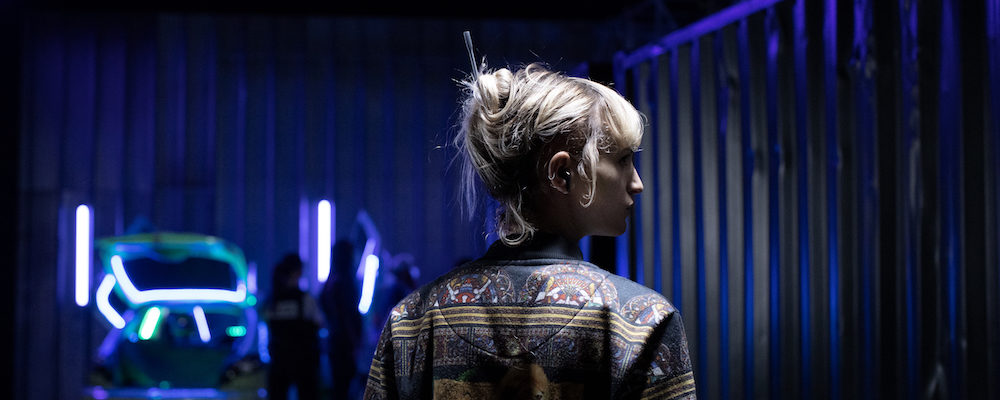‘Titane’ Conjures a Wild Vision of Body Horror and Gender-Bending Suspense
Alci Rengifo
There are still some directors left who want to make films that defy convention. France’s Julia Ducournau is such a director. Her film, “Titane,” doesn’t care about competing to be a typical, commercial film. It prefers to be a feverish oddity, ready to move and disturb you at the same time. The plot can be “described,” but not explained right away in the format of a standard entertainment. For viewers afraid to be bold, “Titane” might just turn them off as another artifact from the experimental wilds of European cinema. A bolder movie lover will find one of the year’s most original works, if not one of the wildest commentaries on motherhood, gender, and car obsessions.
It begins inside a car as a restless young girl sits in the backseat as her father drives. She takes off her seat belt, the dad gets distracted and a crash ensues. Cut to the hospital where doctors place a titanium plate in the girl’s head. When we next see her, Alexia (Agathe Rousselle) is now grown and a dancer, who puts on quite the performance atop a muscle car at a show, writhing to the sounds of “Doing It to Death” by the Kills. One night a too eager fan follows her to her car, asking for an autograph, and a kiss. Alexia complies, for a moment, then she jabs a metal chopstick she uses as a hairpin right into his ear, killing the creeper. What happens next is harder to clarify, but the best description is that Alexia then proceeds to have sex with a car. Later at home she has strange cramps and her stomach begins to slowly grow. She starts having a fling with another woman, which leads eventually to a slew of additional murders. To evade the authorities, Alexia changes her appearance. She is soon taken in by a lonely firefighter captain, Vincent (Vincent Lindon), who mistakes Alexia for his long missing son, Adrien.
This is the second major feature by Ducournau, who first grabbed attention in 2016 with “Raw,” a film about a vegetarian turned cannibal that used college as an allegory for civilization devouring itself. Its bloody images reportedly caused some audience members to pass out at festival screenings. “Titane” proves Ducournau is an original, dynamic filmmaker because she refuses to repeat herself. There are shocking moments where the camera lingers on unsettling images, like the doomed fan convulsing and foaming at the mouth with a chopstick in his ear. In order to change her face, Alexia breaks her nose against a bathroom sink. Once Alexia’s apparent pregnancy really begins to take shape, Ducournau teases us with moments that make us wonder just what is growing inside Alexia’s body. Like David Cronenberg, Ducournau is obsessed with the disturbing potential of our physical selves. Her first film, “Junior,” was about a girl who begins to shed her skin like a snake after getting a stomach bug.
Body horror takes a pause for the richer middle of the movie, when Alexia passes for Vincent’s son Adrien. The older man embraces this person who the other firefighters suspect is somehow off. “Adrien” refuses to speak, but in uniform can at least pull off the part of scrawny fireman. Running from the law, Alexia has successfully tossed away her old gender identity. Ducournau could be called a surrealist, or at least an heir to the tradition, and she understands that true surrealism is irrational but not without thought. The section about Vincent, played with subdued sorrow by the great French actor Vincent Lindon, is both tragedy and allegory. We know this is not Adrien in his room, but he is a man carrying a sadness stemming from loss, because the real Adrien went missing years ago. Vincent wants to believe this is his son, and we can’t fault him much. At night we see Vincent secretly inject himself with heroin. Adrien’s presence helps alleviate the pain he numbs with drugs. The added tension is in how Alexia tapes down her breasts and pregnant stomach to keep up appearances, but when the shape of kicking feet and peeling away of skin begins, she won’t be able to hold her secrets hidden for long.
Endless comparisons will no doubt be made between “Titane” and past surreal visions from directors like David Lynch or Gaspar Noe. Another reference could be Cronenberg’s “Crash.” Ducournau is influenced for sure by her cinematic forebears, but she isn’t an imitator. “Titane” proves that as time goes by, she will keep developing the kind of unique style that will be instantly recognizable as her own. Her camera is alive, with glossy cinematography by Ruben Impens. The images are surreal, nightmarish moments taken from fears about pregnancy, or the need to take on a new identity. Yet it’s not a message film. Ducournau isn’t preaching but evoking. She wants us to feel dread, disgust and abandonment. There’s real heart in the storyline involving Vincent, so Ducournau is also exploring here self-deception when we’re desperate to be loved. The climax of “Titane” is one of the year’s unforgettable delivery scenes. Watch with what skill Ducournau makes us feel dread and tenderness at the same time. In a brilliantly twisted way, this is a provocative movie about many things. A killer flees and takes on a new identity, but with a body entrapped by cold, merciless machinery, which is how we all live now in a world dominated by the technology that has seeped into our every pore.
“Titane” releases Oct. 1 in select theaters.

